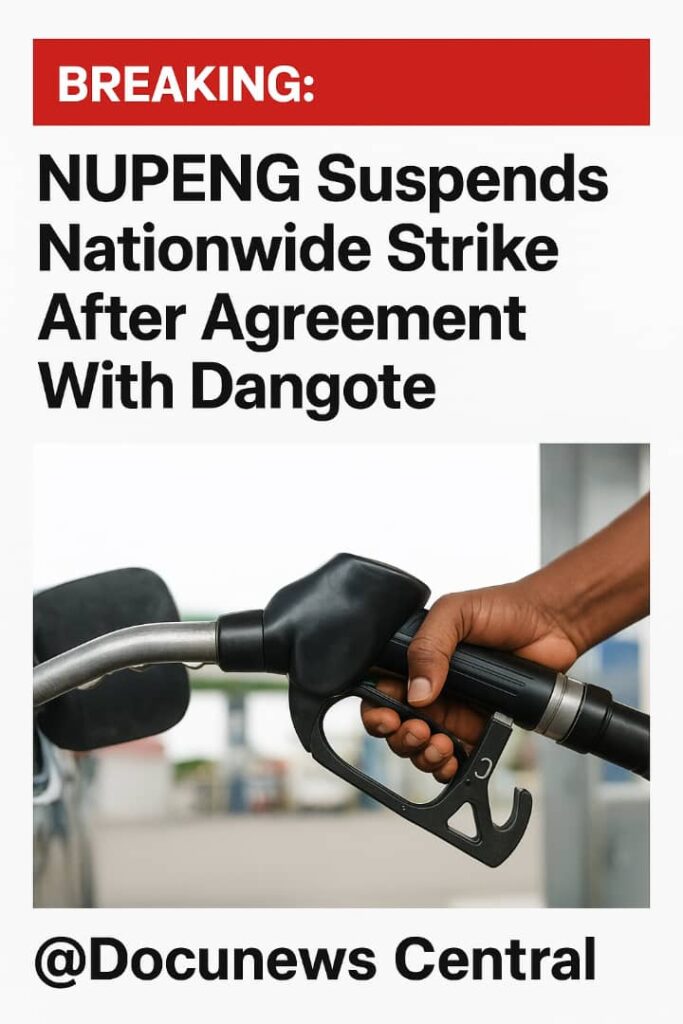
BREAKING: NUPENG Suspends Nationwide Strike After Agreement With Dangote
Nigerians breathe a sigh of relief as the Nigeria Union of Petroleum and Natural Gas Workers (NUPENG) suspends its strike following a landmark deal with the Dangote Group. The move ends days of fuel scarcity fears and brings hope of stability to the oil and gas sector.
Strike That Shook the Nation
For days, Nigerians watched closely as the strike by the Nigeria Union of Petroleum and Natural Gas Workers (NUPENG) spread across the country. The strike was called to force the management of Dangote Refinery and Petrochemicals to respect the rights of workers to form and join unions.
Fuel queues began to return to filling stations. Transporters raised fares. Families worried about food prices. Businesses feared shutdown.
Nigeria depends on oil and gas for energy, jobs, and revenue. Any strike in the sector sends shock waves across the country. That is why the announcement that the strike had been suspended came as a relief to many citizens.
How the Dispute Began
The dispute started when workers at Dangote Refinery demanded the right to be unionized. NUPENG stood with the workers and accused Dangote Group of blocking that right.
Union leaders argued that Nigerian law gives every worker the right to form or join a trade union of their choice. They said Dangote was going against the law.
The union therefore declared a strike. Oil workers across depots, refineries, and distribution points joined. It quickly grew into a nationwide action.
The Dangote Group, on its part, insisted that it was acting in the best interest of the workers. But the pressure of the strike was too heavy to ignore.
Government Steps In
The Federal Government could not sit back. The strike was already raising the fear of fuel scarcity.
The Department of State Services (DSS) called a meeting. The Federal Ministry of Labour and Employment also joined. Labour leaders from the Nigeria Labour Congress (NLC) and Trade Union Congress (TUC) attended. Dangote officials were present.
The talks went long into the night. At last, both sides signed a Memorandum of Understanding (MoU).
What Was Agreed
The key part of the deal was clear: Dangote Refinery and Petrochemicals will allow its workers to unionize.
The MoU stated that the unionization process will start immediately and must be completed between September 9 and September 22, 2025.
NUPENG leaders said they will monitor the process closely. Dangote officials promised to comply with the agreement.
This paved the way for the suspension of the strike.
Joy Across Nigeria
As the news broke, Nigerians celebrated. Filling stations that had closed began to reopen.
In Lagos, queues of cars quickly reduced as marketers assured customers that supply would normalize. In Abuja, commuters said they could now plan their week without fear of higher fares.
Social media was full of comments. Some praised NUPENG for standing firm. Others said Dangote should never have resisted unionization in the first place.
NUPENG Speaks
NUPENG leaders confirmed the strike had been suspended.
In their statement, they thanked Nigerians for their patience. They said the union is always ready to defend the rights of workers. They also warned that if Dangote fails to respect the agreement, the strike could resume.
Dangote Responds
The Dangote Group also released a statement.
It said the company is committed to the welfare of its staff. It promised to obey the law and respect the rights of workers.
The company said it looks forward to working in peace with the unions.
Government Reaction
The Minister of Labour and Employment described the agreement as a “victory for dialogue.”
He said the government is happy that Nigerians will not face more hardship. He praised both sides for choosing peace over conflict.
The DSS also said it will continue to support dialogue to avoid national crises.
What People Are Saying
From Lagos:
“I thank God this strike has ended. I spent hours on the fuel queue. It was stressful,” said Ibrahim, a taxi driver.
From Abuja:
“Workers should always have the right to unionize. Dangote must do the right thing,” said Chinyere, a civil servant.
From Port Harcourt:
“If Dangote did not agree, the strike would have damaged the economy more. They did the right thing,” said Stanley, an oil worker.
From Kano:
“This is good news. But government must make sure both sides keep their word,” said Fatima, a trader.
The Role of Unionization
Unionization is at the heart of the labour movement. It allows workers to have a voice. It gives them the power to negotiate better pay, safe working conditions, and job security.
For years, Dangote companies have faced criticism from unions. Workers often complain about wages and conditions. The refinery, seen as a symbol of Nigeria’s industrial future, could not escape the same calls.
This strike shows that workers are determined to defend their rights.
Economic Impact
The strike lasted only a few days, but the effects were already visible.
Fuel scarcity was beginning to bite. Prices of goods went up in some cities. Transporters increased fares. Some factories reduced working hours.
Analysts warned that if the strike had continued, the economy would have lost billions of naira. The quick resolution saved Nigeria from deeper pain.
Why This Matters
This event is bigger than just a strike. It shows how powerful unions remain in Nigeria. It also shows how much Nigerians depend on oil and gas.
It is also a message to big companies: workers’ rights cannot be ignored.
What Happens Next
The real test now is in the implementation. Will Dangote allow workers to freely unionize? Will the process be smooth?
NUPENG says it will watch closely. The government has promised to stand by the agreement. Nigerians are waiting.
If all sides keep their promises, the refinery will move forward in peace. If not, another strike may come.
Lessons for Nigeria
This strike holds lessons for Nigeria:
- Dialogue works – disputes can be solved without violence.
- Workers have power – when they unite, their voices are heard.
- The oil sector is key – any disruption affects everyone.
- Big companies must respect the law – no company is above the law.
Analysts’ Views
Labour analysts say this is one of the most important union victories in recent years.
“It shows that unions can still hold powerful companies accountable,” said Dr. Oladipo, a labour expert.
Another analyst, Mrs. Uchenna, said: “It is a wake-up call for Nigeria’s labour laws. We must strengthen them to avoid future conflicts.”
The Global Angle
This strike was also watched by investors abroad. Dangote Refinery is Africa’s biggest. It is meant to reduce Nigeria’s dependence on imported fuel.
A stable and peaceful workforce is key for its success. The suspension of the strike sends a signal that disputes can be resolved.
A Turning Point
For NUPENG, this is a proud moment. For Dangote, it is a chance to rebuild trust. For Nigeria, it is a reminder that unity and dialogue can solve even the hardest problems.
Final Word
NUPENG has suspended its strike. Dangote has agreed to unionization. The government has played its role. Nigerians are relieved.
But the story is not yet over. All eyes are on the refinery. The coming weeks will show if the agreement will stand.
✍️ @DocuNews Central








